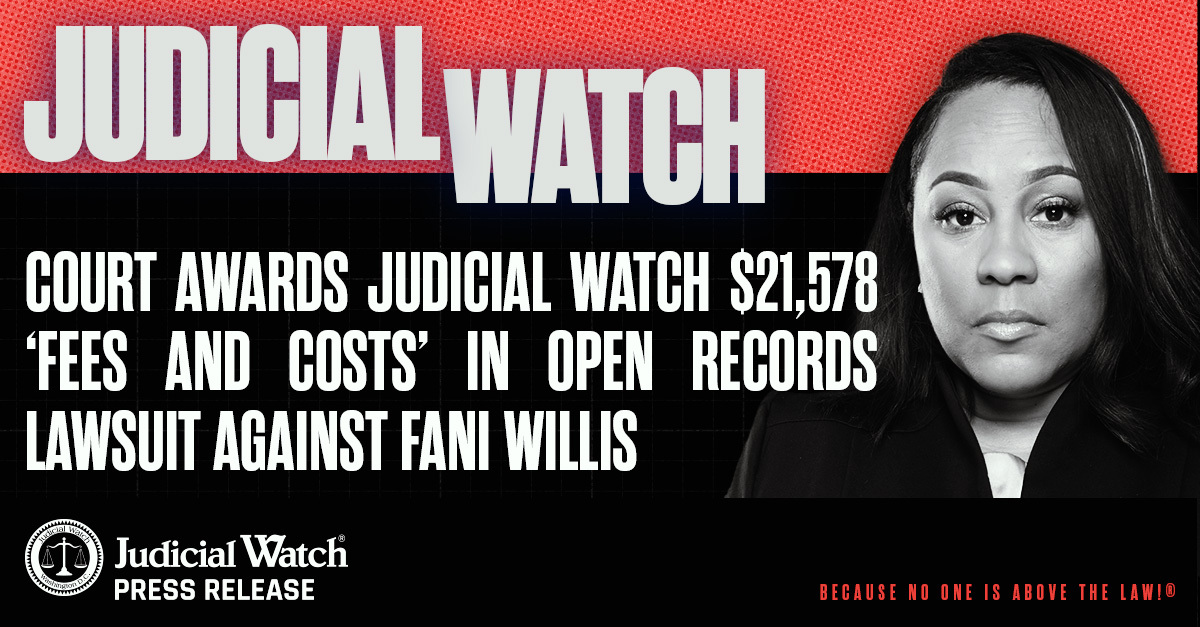

Judicial Watch: Hillary Clinton Files New Answers Under Oath about Email System – Used It for the ‘Purpose of Convenience’
(Washington, DC) –Judicial Watch announced today Hillary Clinton submitted additional written answers under oath about her email system. Clinton testified that she used the controversial email system for the “purpose of convenience.” Clinton initially objected and refused to answer the questions but was ordered to do so last month by U.S. District Court Judge G Emmet Sullivan.
The court ordered Clinton to “[D]escribe the creation of the clintonemail.com domain name and the decision to set the domain up on the existing server, the date it was decided to create the domain and set it up on the existing server, who made those decisions, and when the domain became operational on the existing server.”
Clinton answered under oath:
Subject to and without waiving the forgoing objections, Secretary Clinton answers as follows: As Secretary Clinton prepared in late 2008/early 2009 to serve as Secretary of State, she was aware that President Clinton’s office had set up an e-mail system, but she had no role in this process. Secretary Clinton knew that President Clinton’s staff had recently upgraded that system. Secretary Clinton does not know what equipment that system used, how it was created, who decided that the system needed to be upgraded, or who else had accounts on the system. Secretary Clinton believes that one of the President’s aides, Justin Cooper, set up the system. Secretary Clinton decided to use a clintonemail.com account on the system for the purpose of convenience. Secretary Clinton recalls that the clintonemail.com account was created in early 2009. Although Secretary Clinton does not have specific knowledge of the details of the creation of the account, the “domain,” or the “domain name,” her best understanding is that Mr. Cooper set it up.
To another question regarding her October 22, 2015, testimony before the U.S. House of Representatives Select Committee on Benghazi, during which she testified that 90 to 95 percent of her emails “were in the State’s system” and “if they wanted to see them, they would certainly have been able to do so,” Clinton suggests she learned this from her attorneys, who seem to have guessed this answer.
In a separate Judicial Watch Freedom of Information Act (FOIA) lawsuit that first led to the disclosure of the “private” Clinton email system, U.S. District Court Judge Royce C. Lamberth called the Clinton email issue “one of the gravest modern offenses to government transparency” and ordered additional discovery into whether Hillary Clinton’s use of a private email while Secretary of State was an intentional attempt to “stymie” FOIA.
“Mrs. Clinton’s assertion that she used a separate email system as a matter of ‘convenience’ is simply not credible and is belied by evidence and testimony,” said Judicial Watch President Tom Fitton. “We intend to pursue additional questions with Mrs. Clinton and others on this blatant attempt to hide her emails from Judicial Watch, the courts, Congress, and the American people.”
In 2016, Clinton was required to submit under oath written answers to Judicial Watch’s questions. Clinton objected to and refused to answer questions about the creation of her email system; her decision to use the system despite warnings from State Department cybersecurity officials; and the basis for her claim that the State Department had “90-95%” of her emails.
After a lengthy hearing on November 13, U.S. District Court Judge Emmet Sullivan ruled that Clinton must address two questions that she refused to answer under-oath.
Judge Sullivan read his opinion from the bench, deciding that the question about the creation of the email system was within the scope of discovery. Judge Sullivan rejected Clinton’s assertion of attorney-client privilege on the question about the emails “in the State’s system.”
The answers now provided by Clinton are the latest development in a Judicial Watch FOIA lawsuit about the controversial employment status of Huma Abedin, former deputy chief of staff to Clinton. The lawsuit, which seeks records regarding the authorization for Abedin to engage in outside employment while employed by the Department of State, was reopened because of revelations about the clintonemail.com system (Judicial Watch v. U.S. Department of State (No. 1:13-cv-01363)). The court also granted discovery to Judicial Watch to help determine if and how Clinton’s email system thwarted FOIA.
###















